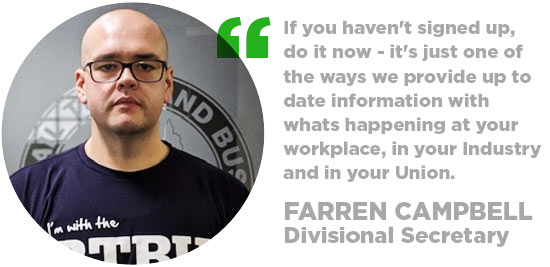Get in behind the KiwiRail workers this Christmas – Business Desk
Dear members,
Please see the below article from Business Desk about supporting KiwiRail workers these holidays.
The 2,500 KiwiRail workers walking off the job in the run-up to Christmas are doing the right thing.
The two-day rolling strike across the islands is designed to hit the state-owned rail operator right where it hurts – in the bank balance.
The commuter disruption in Auckland and Wellington is barely an inconvenience on what will be the last day of the school year, and possibly an early start to the Christmas holiday for many of our white-collar urbanites.
The sold-out Interislander ferries will be slightly more annoying for those people crossing the Cook Strait on the Friday or Saturday, as they embark on their yearly summer road trip, but there’s still the Bluebridge and people will still have a week to find another way to reach their Christmas destination.
Where it will bite is in KiwiRail’s freight, which directly accounts for more than half its revenue and feeds into other income streams including its property portfolio.
For the striking workers, the timing is perfect: a week before Christmas disrupting goods as they’re moved around the country ahead of the mad dash for last-minute Christmas gifts, without directly holding people up on that final project for the year or stopping them from getting home for the holiday.
For KiwiRail, the kowtowing to angry customers will go far beyond the two days of disruption. Given the hard-nosed dealings they’ve had with the now-departed chief executive Greg Miller, it’s easy to imagine they won’t be very forgiving to the state-owned enterprise.
It’s a great example of using what leverage you have available.
Old Friends
KiwiRail has traditionally had good relations with the unions.
In 2018, Rail and Maritime Transport Union (RTMU) general secretary Wayne Butson described the rail operator’s three-year ‘High Performance, High Engagement’ programme as “encouraging and energising”, with management seriously considering suggestions put forward by their workers and leading to a two-year pay rise upfront and weighted to the bottom end of the pay scale.
That goodwill went out the window under Miller’s stewardship of the rail operator. In the latest round of pay negotiations for an 8% hike, the ill will got stoked by KiwiRail’s counteroffers which were seen as “insulting” and “derisory”, and the large bonuses paid to management at a time when union members agreed to no increase because of the covid-19 pandemic.
With Miller’s exit, Butson has said there may be a pathway to redemption given the relationship with the past CEO was an “integral factor” to the dispute.
Logistics firms, wholesalers and retailers up and down the country will be crossing their fingers that wise heads prevail and will probably be rooting for an offer of an 8% pay hike to make sure a deal is reached. After almost two years of covid lockdowns and shipping disruptions, none of them want further uncertainty in the supply chain over the all-important summer spend-up.
Those logistics firms will well remember the headaches caused by the disruption to national fuel supplies in late 2017 when the pipeline running from the Marsden Point oil refinery to Auckland was ruptured by a digger.
The following year held more heart-fluttering moments for them when fuel tanker drivers and Air New Zealand staff both threatened to walk off the job in the run-up to Christmas, with deals cut in the fortnight before Christmas day.
Brinkmanship can work, and the rail workers are playing their hand brilliantly.
A Red Tide
Unions may appear to be more militant under a Labour-led government, but that’s because there’s no point picking fights in a hostile environment. No one wants to enter negotiations from a place of disadvantage.
We got a perfect example of the dangers of high stakes brinkmanship in Wellington this week when the National party imploded after leader Judith Collins pushed the button in what looks like mutually assured destruction.
A phoenix may yet arise from the old party’s ashes, but the Nats wouldn’t be in the driver’s seat if forced into a formal merger a la the United-Reform coalition of the 1930s that was the precursor to the current conservative party.
Just look at ascendant Act party leader David Seymour, who’s always been a capable performer in the House. He’s tweaked his speaking style to match his rising poll numbers, shedding the old goofiness and sporting a more statesmanlike delivery in his parliamentary speeches.
If there’s to be a political merger on the cards, Act isn’t going to be the one to be railroaded.
That steel is what’s required in negotiations, be it industrial, commercial, or political.
We often hear about win-win outcomes being achieved, but that’s not for lack of the parties trying to one-up their counterpart given that’s what negotiations are all about – getting what you want from someone else.
KiwiRail has achieved some excellent commercial results despite a clunky capital structure that desperately needs overhauling and has typically been an excellent employer among the country’s heavy industries.
If rail workers are threatening to down tools for a couple of days in the first major walk-out in more than 25 years, maybe their counterparts can look a little closer at top-line growth and reconsider how much goes into widening margins.
Because people who care enough about their jobs to put their prospects on the line by striking are the sorts of highly-engaged people employers are lucky to have.




